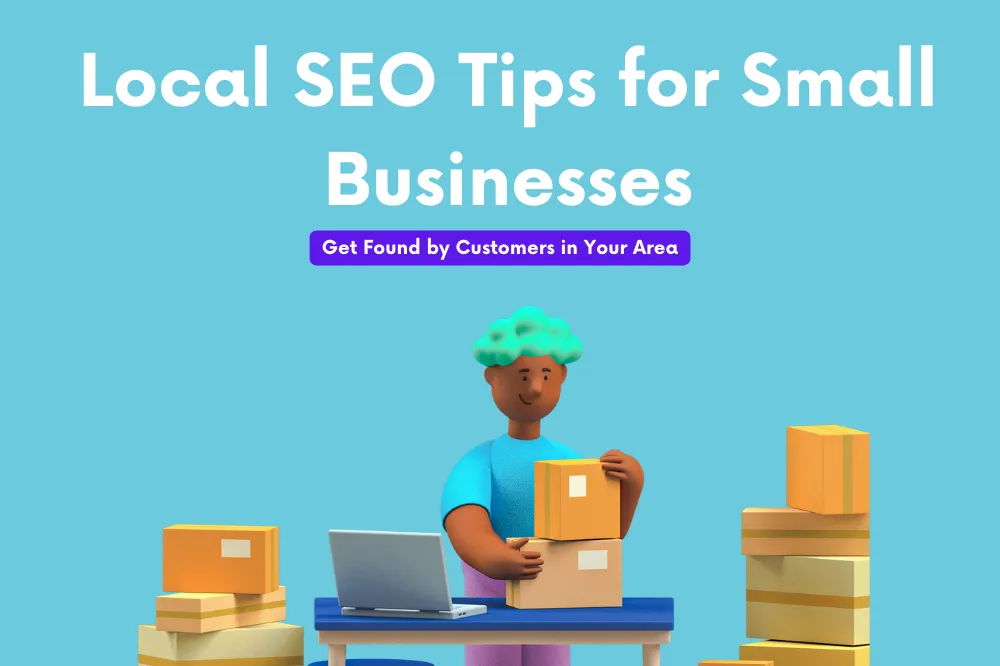10 min read Local SEO Tips for Small Businesses: Getting Found by Customers in Your Area

Ever wondered why your small business isn't getting the foot traffic it deserves despite having stellar products or services? The answer might lie in your local SEO strategy—or the lack thereof. In today's digital age, mastering local SEO is crucial for small businesses aiming to get found by customers in their area. In this comprehensive guide, we will delve into the nuts and bolts of local SEO, providing actionable tips to help you boost your local online presence.
Understanding Local SEO
Definition of Local SEO
Local SEO is the process of optimizing your online presence to attract more business from relevant local searches. These searches take place on search engines like Google and Bing and often include location-specific keywords.
How Local SEO Differs from General SEO
While general SEO focuses on improving your site's visibility on a national or global scale, local SEO zeroes in on increasing your visibility in local search results. This involves a variety of strategies such as optimizing your Google My Business profile, local keyword usage, and generating local reviews.
Setting Up Your Google My Business Profile
Importance of Google My Business (GMB)
Google My Business is a free tool that allows you to manage your online presence across Google, including Search and Maps. A well-optimized GMB profile can significantly enhance your local search visibility.
Step-by-Step Guide to Setting Up GMB
- Go to the Google My Business website and sign in with your Google account.
- Enter your business name and address.
- Choose your business category.
- Add your business phone number and website.
- Verify your business via postcard, phone, or email.
Optimizing Your GMB Profile
- Ensure your business information is accurate and complete.
- Add high-quality photos of your business.
- Encourage customers to leave reviews.
- Regularly update your profile with new information and posts.
If you face any problem setting up your GMB account, you can get help from the Local SEO experts of our platform.
Leveraging Local Keywords
Importance of Local Keywords
Local keywords help search engines understand the relevance of your business to specific geographic areas, increasing your chances of appearing in local search results.
How to Research Local Keywords
Use tools like Google's Keyword Planner, SEMrush, or Ahrefs to find keywords that include your location. For example, if you run a bakery in Austin, you might use keywords like "Austin bakery" or "best cakes in Austin."
Implementing Local Keywords on Your Website
Incorporate these keywords into your website's meta descriptions, title tags, headers, and content. Ensure that your NAP (Name, Address, Phone number) information is consistent across your site.
Creating Local Content
Benefits of Localized Content
Creating content that speaks to local interests and issues can help establish your business as a local authority and attract more local visitors to your site.
Types of Local Content to Create
- Blog posts about local events or news
- Guides to your city or neighborhood
- Testimonials from local customers
- Case studies highlighting local clients
How to Optimize Local Content for SEO
Use local keywords naturally within your content, include internal links to relevant pages on your site, and share your content on local forums and social media groups. Hire a creative content writer today!
Building Local Citations
What are Local Citations?
Local citations are mentions of your business's name, address, and phone number (NAP) on other websites. These can include local business directories, websites, and social media platforms.
Importance of Accurate Citations
Accurate citations help search engines confirm the legitimacy and location of your business. Inaccurate or inconsistent information can harm your local SEO efforts.
How to Build and Manage Local Citations
Submit your business information to local directories such as Yelp, Yellow Pages, and local chamber of commerce websites. Regularly check and update your citations to ensure accuracy. Hire citation experts and get high quality citation without spending a dime.
Online Reviews and Reputation Management
Impact of Online Reviews on Local SEO
Online reviews are a significant ranking factor for local search. Positive reviews can boost your visibility and attract more customers.
Encouraging Positive Reviews
Ask satisfied customers to leave reviews on Google, Yelp, and other relevant platforms. Make it easy by providing direct links to your review profiles.
Managing Negative Reviews
Respond to negative reviews promptly and professionally. Address the issues raised and show that you care about customer satisfaction. This can help mitigate the impact of negative reviews.
Optimizing for Mobile Search
Importance of Mobile Optimization for Local SEO
With more people using mobile devices to search for local businesses, having a mobile-friendly website is essential. Google also considers mobile-friendliness as a ranking factor.
Tips for Mobile-Friendly Website Design
- Use a responsive design that adapts to different screen sizes.
- Ensure text is readable without zooming.
- Optimize images for faster loading times.
- Simplify navigation for a better user experience.
Ensuring Fast Load Times
A fast-loading website enhances user experience and improves your search rankings. Use tools like Google PageSpeed Insights to test and optimize your site’s speed.
Utilizing Social Media for Local Engagement
Role of Social Media in Local SEO
Social media platforms can help you connect with your local audience, drive traffic to your website, and improve your local search rankings.
Engaging with Local Community on Social Media
Share local news, events, and promotions on your social media profiles. Engage with local influencers and businesses to expand your reach.
Promoting Local Events and Offers
Use social media to promote special offers, discounts, and events. Encourage your followers to share your posts to increase visibility.
Thanks for reading this far. However, are you finding yourself under the water to get it all sorted? We have a fully dedicated Local SEO agency that only serve local businesses all accross the world. You can contact us here.
Local Link-Building Strategies
Importance of Backlinks for Local SEO
Backlinks from reputable local websites signal to search engines that your business is trustworthy and relevant to the local area.
How to Get Local Backlinks
- Partner with local bloggers and influencers.
- Sponsor local events or charities.
- Submit guest posts to local websites and blogs.
Building Relationships with Local Influencers
Collaborate with local influencers to reach a broader audience. Influencers can provide valuable backlinks and promote your business to their followers.
Schema Markup for Local SEO
What is Schema Markup?
Schema markup is a type of code that helps search engines understand the content of your website. It can improve the way your page is displayed in search results.
How to Implement Local Business Schema
Add schema markup to your website’s HTML to provide search engines with detailed information about your business, such as your address, phone number, and operating hours.
Benefits of Schema Markup for Local Search
Schema markup can enhance your search result listings with rich snippets, making them more attractive and informative to users.
Tracking and Analyzing Local SEO Performance
Tools for Tracking Local SEO
Use tools like Google Analytics, Google Search Console, and Moz Local to monitor your local SEO performance.
Key Metrics to Monitor
- Local search rankings
- Website traffic from local searches
- Click-through rates from local search results
- Number of local citations
- Online reviews and ratings
Adjusting Strategy Based on Data
Regularly review your performance data and adjust your local SEO strategy accordingly. Focus on areas where you see the most significant opportunities for improvement.
Voice Search Optimization
Rise of Voice Search
With the increasing use of voice-activated devices, optimizing for voice search is becoming essential for local businesses.
Tips for Optimizing for Voice Search
- Use natural language and long-tail keywords.
- Ensure your website answers common questions related to your business.
- Optimize your Google My Business profile for voice search.
How Voice Search Impacts Local SEO
Voice search often includes local intent, making it crucial for businesses to be optimized for these queries to capture nearby customers.
Common Local SEO Mistakes to Avoid
Overview of Common Pitfalls
- Inconsistent NAP information
- Ignoring mobile optimization
- Failing to update Google My Business profile
- Neglecting online reviews
- Not utilizing local keywords
How to Avoid These Mistakes
Ensure your business information is consistent across all platforms, regularly update your profiles and listings, and engage with your local community online.
Best Practices for Continuous Improvement
Stay updated with local SEO trends, regularly audit your SEO strategy, and make adjustments as needed to maintain and improve your local search rankings.
Conclusion
In conclusion, local SEO is a powerful tool for small businesses looking to attract more customers in their area. By setting up and optimizing your Google My Business profile, leveraging local keywords, creating local content, and engaging with your community both online and offline, you can significantly enhance your local search visibility. Start implementing these tips today and watch your business grow.
FAQs
How Long Does It Take to See Results from Local SEO?
Results from local SEO efforts can typically be seen within three to six months, depending on the competitiveness of your market and the consistency of your efforts.
Can I Do Local SEO on My Own, or Do I Need to Hire an Expert?
While it's possible to manage local SEO on your own, hiring an expert can provide you with professional insights and save time, especially if you're new to SEO.
What’s the Difference Between Local SEO and Regular SEO?
Local SEO focuses on optimizing your online presence for a specific geographic area, while regular SEO aims to improve your site's visibility on a national or global scale.
How Often Should I Update My Google My Business Profile?
You should update your Google My Business profile regularly, especially when you have new offers, events, or changes in your business information.
What Are the Best Tools for Local SEO?
Some of the best tools for local SEO include Google My Business, Moz Local, SEMrush, Ahrefs, and Google Analytics.






































































